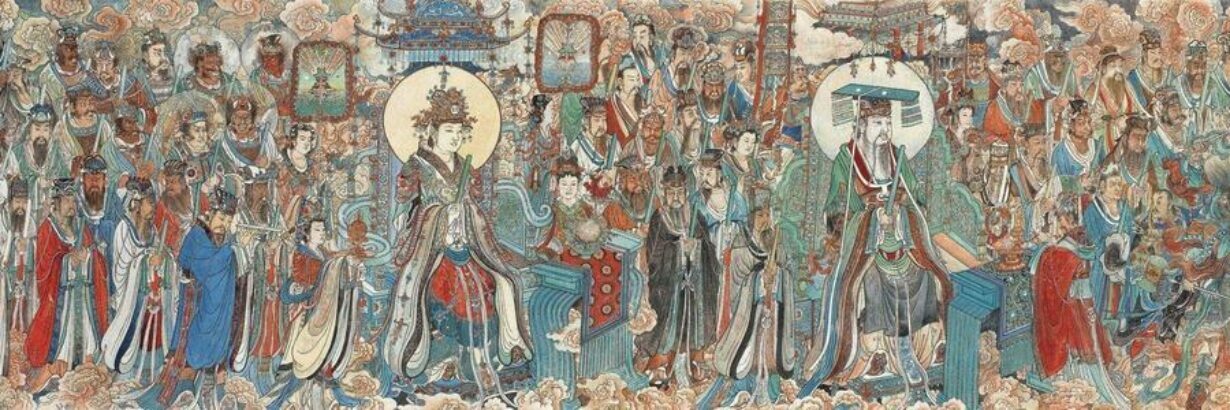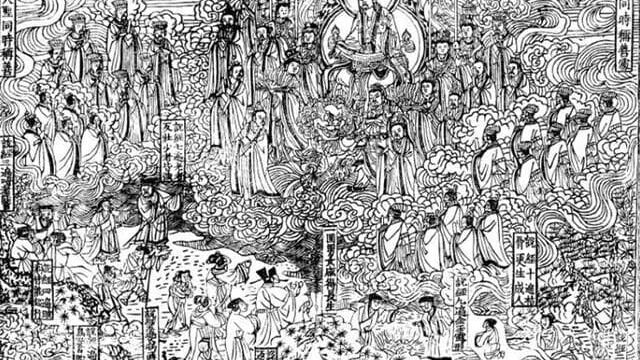In Daoism, there are ten evil actions that, if committed, bring harm from spirits and lead to a miserable fate in the realm of the underworld. These teachings are upheld by the Celestial Masters (汉天师府) of the Han lineage.
The ten evil actions, also known as the “Ten Evil Actions” (十恶业), consist of three actions of the body (身三恶业), three actions of the mind (心三恶业), and four actions of speech (口四恶业).
In the “Huangjing Jizhu” (皇经集注) (Annotated Compilation of the Sacred Scriptures), Volume Three, it is stated that even if one lacks inherent wisdom, they can still commit the ten evil actions. The original annotation explains that committing these actions leads to the obstruction of the ten evil karmic hindrances (造十恶业障). The ten evil actions refer to the following: the three actions of the body include killing (杀生), stealing (偷盗), and sexual misconduct (邪淫); the three actions of the mind include greed (贪), anger (嗔), and delusion (痴); and the four actions of speech include lying (两舌), divisive speech (恶骂), abusive speech (绮语), and frivolous speech (妄言). Accumulating these ten evils will result in karmic retribution, hence the term “evil actions” (恶业).
In the “Daomen Jing Fa Xiang Cheng Ci Xu” (道门经法相承次序) (Succession and Sequence of Daoist Scripture and Dharma), Volume One, it is asked what constitutes the three actions. The first is the action of the body, which involves killing, stealing, and sexual misconduct. The second is the action of the mind, which involves greed, anger, and delusion. The third is the action of speech, which includes abusive speech, divisive speech, frivolous speech, and false speech. These are known as the three actions. The original annotation explains that the three actions of the body, mind, and speech encompass the ten evils (即十种恶行).
In the “Da Dong Yu Jing Shu Yao Shi Er Yi” (大洞玉经疏要十二义) (Essential Summary of the Twelve Meanings in the Great Cave Jade Scripture), it states that the ten evils consist of greed (贪), anger (嗔), delusion (痴), killing (杀), stealing (盗), sexual misconduct (淫), false speech (妄言), frivolous words (妄语), divisive speech (两舌), and abusive speech (恶骂).
The ten evils are referred to as the ten negative behaviors resulting from the movements and actions of the body, speech, and mind, in contrast to the ten virtues.
These ten evils are as follows: false speech (妄言), frivolous words (绮语), divisive speech (两舌), and abusive speech (骂詈), which are the four negative speech actions. The opposite of these actions would be virtuous. Then, there are the three negative actions of the body, which are greed (贪欲), theft (窃盗), and sexual misconduct (奸淫). Finally, there are the three negative actions of the mind, which are envy (嫉妒), anger (恚嗔), and doubt (邪疑). The actions of the mind are the most crucial, forming the root of the ten evils (心业最重,为十恶根). By cutting off this root of evil, one can cultivate the foundation of the ten virtues (斩绝恶根,修十善本).

The ten evils refer to ten specific negative behaviors.
These include: indulging in alcohol and sexual misconduct (饮酒淫色), insatiable greed (贪欲无已); engaging in deceitful activities, defaming Daoist practitioners (阴贼世间,讪谤道士); disrespecting teachers and neglecting the teachings, being arrogant and disregarding the Three Treasures (Buddha, Dharma, and Sangha) (轻师慢法,傲忽三宝); stealing scriptures and spreading distorted teachings (窃取经书,妄宣道要); borrowing and not returning, deceiving virtuous people (借换不还,欺诱善民); killing for pleasure and being hypocritical in speech and thought (杀生贪味,口是心非); being unfilial, betraying kindness, and violating moral principles (不孝背恩违义,犯诸禁忌); neglecting the recitation of scriptures, being arrogant and self-righteous (诵经忽略,傲高自是); blaming others and being angry, hateful, and resentful (责望人意,嗔恚四辈); distorting the teachings to suit personal opinions, undermining and altering sacred scriptures, denying fate, and indulging in impulsive desires (臆断经旨,损益圣典,不信宿命,快情所为); defiling and disrespecting the four great elements (earth, water, fire, and air), disregarding the path of life (秽慢四大,不念生道).
In the “Dong Zhen San Tian Mi Hui” (洞真三天秘讳), it is said that those who violate these ten admonitions cannot escape the consequences. Those who commit these actions will face punishment, suffering the wrath of spirits, enduring countless agonies, and never finding peace. They will encounter misfortune in all directions, and upon death, they will descend into the realm of hell (此十恶之诫,不能离身,犯之者身遭众横,鬼神害命,考楚万痛,恒无一宁,履善遇恶,万向失利,死入地狱).
Written & Edited by XuanMenJun玄门君

